外研版(2019) 必修 第三册 Unit 5 What an adventure! Language points(共24张PPT)
文档属性
| 名称 | 外研版(2019) 必修 第三册 Unit 5 What an adventure! Language points(共24张PPT) | 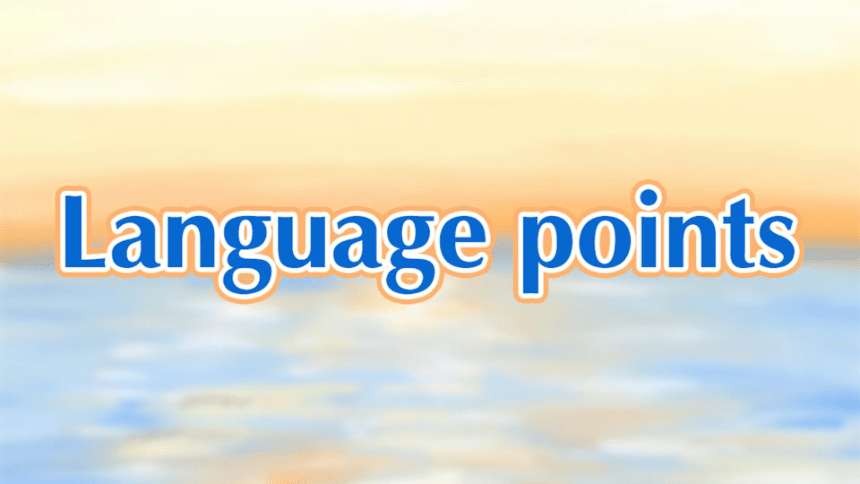 | |
| 格式 | zip | ||
| 文件大小 | 1011.0KB | ||
| 资源类型 | 教案 | ||
| 版本资源 | 外研版(2019) | ||
| 科目 | 英语 | ||
| 更新时间 | 2023-03-12 11:57:13 | ||
图片预览

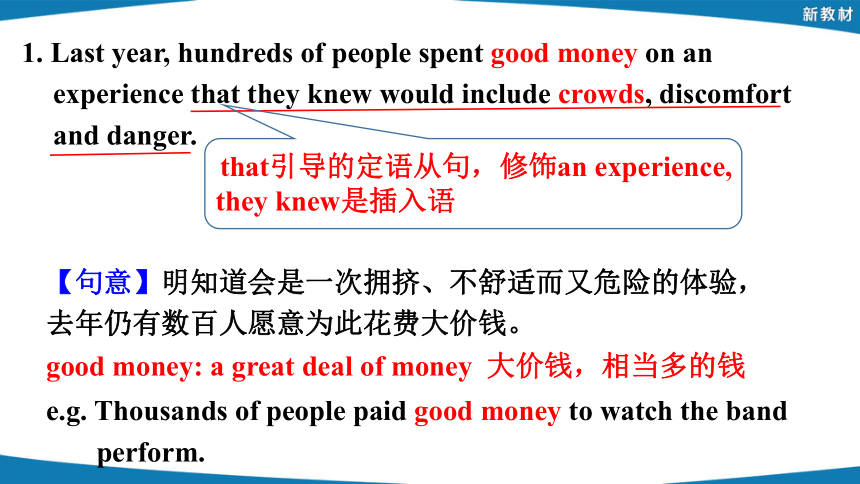
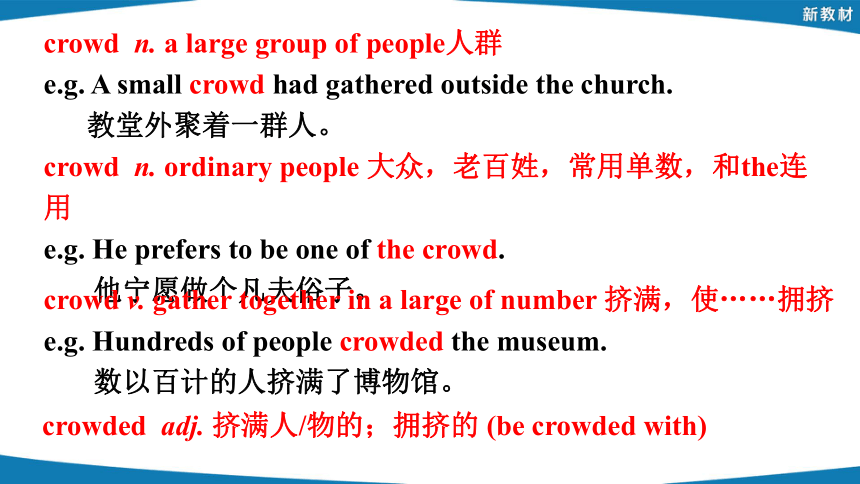
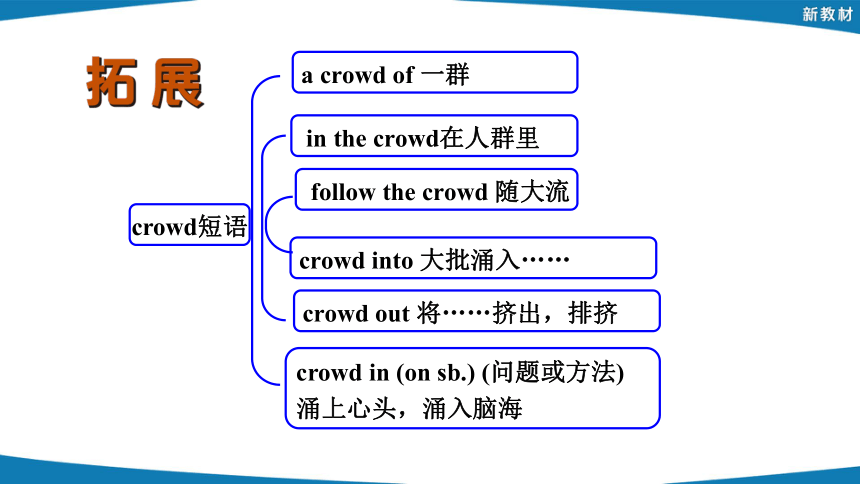
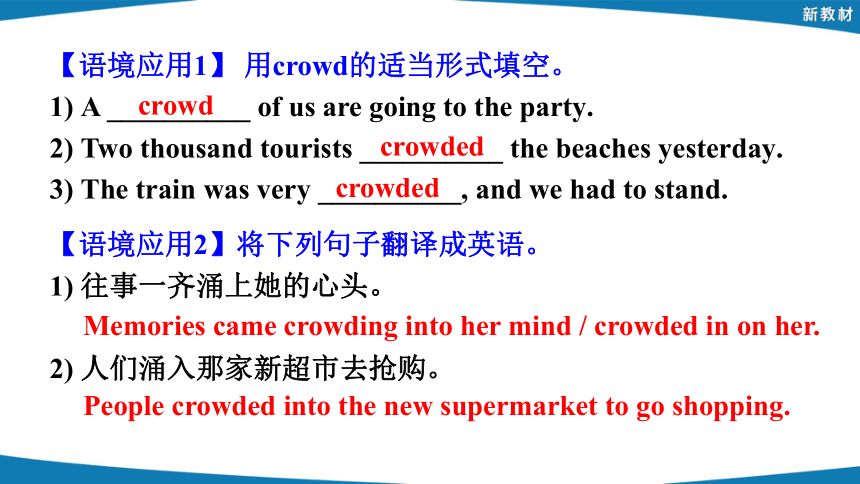
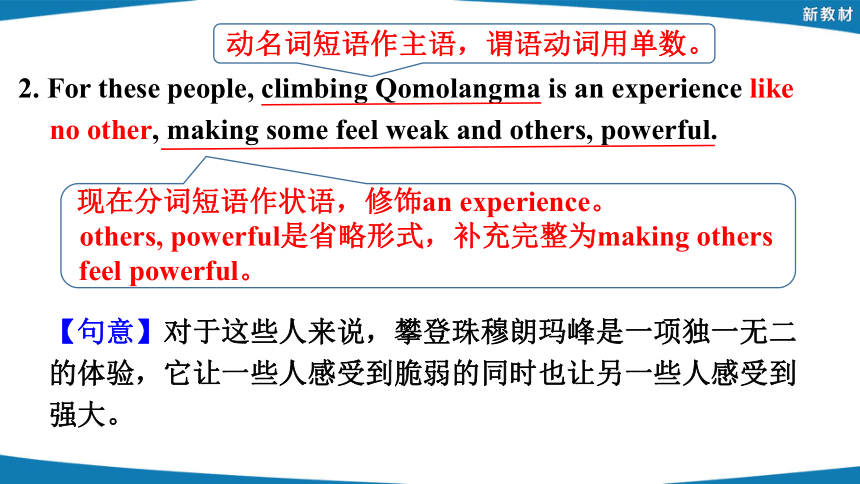
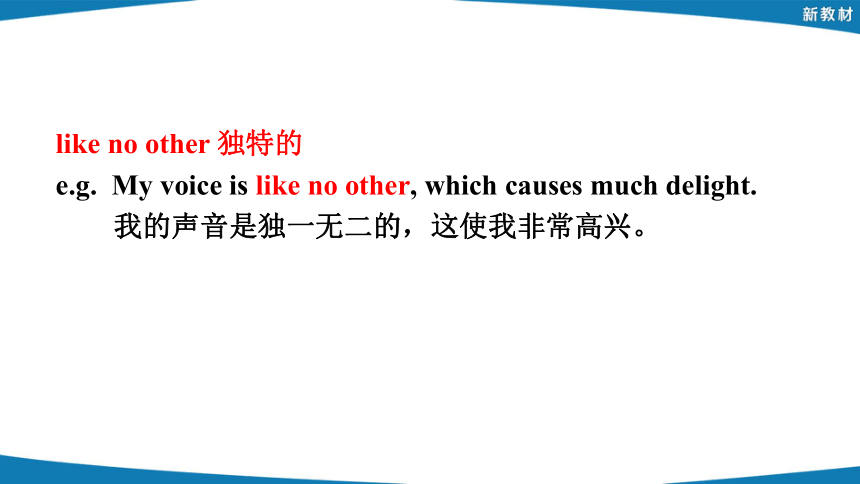
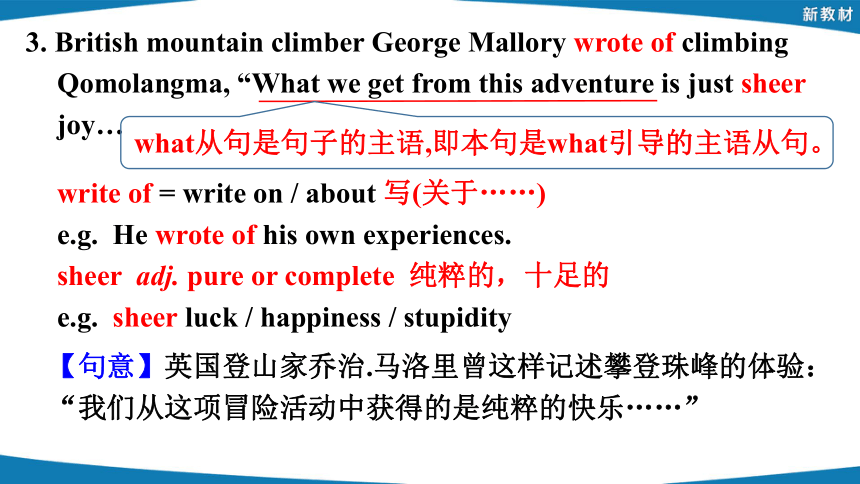
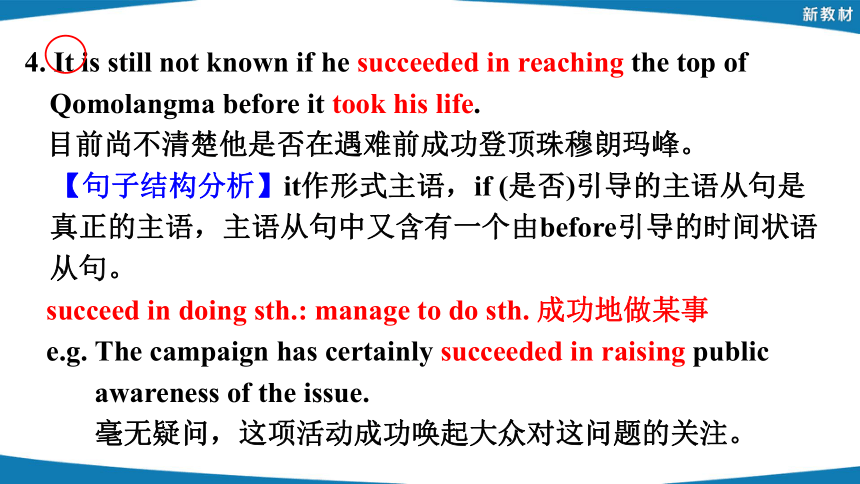
文档简介
(共24张PPT)
1. Last year, hundreds of people spent good money on an experience that they knew would include crowds, discomfort and danger.
【句意】明知道会是一次拥挤、不舒适而又危险的体验,去年仍有数百人愿意为此花费大价钱。
that引导的定语从句,修饰an experience, they knew是插入语
e.g. Thousands of people paid good money to watch the band perform.
good money: a great deal of money 大价钱,相当多的钱
crowd n. a large group of people人群
e.g. A small crowd had gathered outside the church.
教堂外聚着一群人。
crowd n. ordinary people 大众,老百姓,常用单数,和the连用
e.g. He prefers to be one of the crowd.
他宁愿做个凡夫俗子。
crowd v. gather together in a large of number 挤满,使……拥挤
e.g. Hundreds of people crowded the museum.
数以百计的人挤满了博物馆。
crowded adj. 挤满人/物的;拥挤的 (be crowded with)
crowd短语
a crowd of 一群
crowd in (on sb.) (问题或方法)
涌上心头,涌入脑海
in the crowd在人群里
follow the crowd 随大流
crowd into 大批涌入……
crowd out 将……挤出,排挤
【语境应用1】 用crowd的适当形式填空。
1) A __________ of us are going to the party.
2) Two thousand tourists __________ the beaches yesterday.
3) The train was very __________, and we had to stand.
crowd
crowded
crowded
【语境应用2】将下列句子翻译成英语。
1) 往事一齐涌上她的心头。
2) 人们涌入那家新超市去抢购。
Memories came crowding into her mind / crowded in on her.
People crowded into the new supermarket to go shopping.
2. For these people, climbing Qomolangma is an experience like no other, making some feel weak and others, powerful.
动名词短语作主语,谓语动词用单数。
现在分词短语作状语,修饰an experience。
others, powerful是省略形式,补充完整为making others feel powerful。
【句意】对于这些人来说,攀登珠穆朗玛峰是一项独一无二的体验,它让一些人感受到脆弱的同时也让另一些人感受到强大。
like no other 独特的
e.g. My voice is like no other, which causes much delight.
我的声音是独一无二的,这使我非常高兴。
3. British mountain climber George Mallory wrote of climbing Qomolangma, “What we get from this adventure is just sheer joy…
what从句是句子的主语,即本句是what引导的主语从句。
write of = write on / about 写(关于……)
e.g. He wrote of his own experiences.
sheer adj. pure or complete 纯粹的,十足的
e.g. sheer luck / happiness / stupidity
【句意】英国登山家乔治.马洛里曾这样记述攀登珠峰的体验:“我们从这项冒险活动中获得的是纯粹的快乐……”
4. It is still not known if he succeeded in reaching the top of Qomolangma before it took his life.
目前尚不清楚他是否在遇难前成功登顶珠穆朗玛峰。
【句子结构分析】it作形式主语,if (是否)引导的主语从句是真正的主语,主语从句中又含有一个由before引导的时间状语从句。
succeed in doing sth.: manage to do sth. 成功地做某事
e.g. The campaign has certainly succeeded in raising public awareness of the issue.
毫无疑问,这项活动成功唤起大众对这问题的关注。
take one’s life: to kill someone 夺去某人的生命
e.g. The big earthquake took millions of people’s life.
The Himalayas have taken the lives of countless mountain climbers.
5. In 2011, words similar to those of Mallory were spoken by American mountain climber Alan Arnette, who climbed Qomolangma in that year and was going to climb other high mountains around the world.
who引导的非限制性定语从句,对Alan Arnette进行补充说明。
【句意】2011年,美国登山家艾伦.阿内特也说过与马洛里类似的话。那一年他登上了珠峰,之后又准备去攀登世界各地其他的高山。
6. It brings into focus what's important to you.
【句子结构分析】本句正常语序为:It brings what’s important to you into focus. 因brings的宾语what’s important to you 较长,为避免头重脚轻,所以后置了。
【句意】它会让你关注对你来说重要的事情。
bring …into focus 使……成为焦点
e.g. It’s an opportunity to bring your goals into focus and transfer your ideas into the real world.
这为你提供一个机会,使你把目标定得更为集中,并帮
助你把理想变成现实。
7. It forces you to look deep inside yourself and figure out if you really have the physical, as well as mental, toughness to push when you want to stop.
它会强迫你去深入地审视自己,去思考自己的身体和心灵是否足够坚强,能在你想放弃的时候推动你继续前行。
figure out: to work out, to understand 算出;理解,弄清
e.g. Please help me to figure out my income tax.
请帮我计算出我的所得税。
We must figure out how to solve the problem.
我们必须想办法解决这个问题。
【拓展】figure in 算进去
e.g. Peter was asked by his boss to figure in the spending of traveling in Europe.
老板要求彼得把在欧洲旅行的费用也算进去。
【语境应用】汉译英。
1) Sam昨天没用多长时间就弄懂怎么使用那台机器了。
2) 全班只有Jenny算出那道数学题的答案了。
Yesterday it didn’t take Sam very long to figure out how to use that machine.
Jenny was the only one in the entire class who figured out the answer to that math problem.
8. With the majority of attempts to climb Qomolangma resulting either in total success or failure, is there also a scientific reason behind this risk-taking
with + O.+ v-ing 是with复合结构,作伴随状语。v.-ing短语作宾语补足语,resulting和attempts是主动关系;
不定式短语to climb Qomolangma作后置定语,修饰attempts。
【句意】攀登珠峰的大多数尝试要么大获全胜,要么彻底失败,这一冒险行为的背后是否也有科学解释呢?
该问句在段落中具有衔接功能,即通过概括探险成败情况承接前文,再通过设问引发读者对探险者冒险行为的动机进行深层思考,引出下文的研究结构和分析。
He refers to the personalities of these people as “Type T”, with the “T” standing for “thrill”.
with + O.+ v-ing 构成的with复合结构,作伴随状语很常见,如本段最后一句中也有这种结构:
他指出有这些性格特征的人是T型人,T代表thrill。
refer to…as…: use a particular word, expression, or name to mention or describe something 把……称作……
e.g. Marcia referred to Jerry as a dear friend.
Marcia称Jerry为挚友。
refer to
参考,查阅
指的是
提到,谈到,涉及
把……称作
常用结构:refer to ... as ...
e.g. The expert spoke for an hour without referring to her notes.
专家讲了一个小时,一次都没看她的笔记。
I believe Frank wasn’t referring to me when he said someone was not careful.
我相信弗兰克说有人不小心时并不是指我。
In Peter’s speech, he referred to a recent trip to Canada.
在彼得的演讲中,他提到了最近一次加拿大之行。
The new law does not refer to land used for farming.
新法与耕地无关。
【语境应用】汉译英。
1) 我再也不想提这件事了。
2) 不用看书我也能回答这些问题。
3) 英语被称为世界语言。
I don’t want to refer to this matter any more.
I can answer these questions without referring to the book.
English is referred to as the world language.
9. Speaking to the LA Times about the “Type T” personalities, Farely said…
【句意】在对《洛杉矶时报》描述“T型人格”时,法利说道……
现在分词短语作时间状语。
e.g. Taking a key out of his pocket, he opened the door.
(= After he took a key…)
Turning around, she saw an ambulance driving up. (=When she turned around…)
10. Research also suggests that our desire to seek risks can be connected to how much we expect to benefit from the result.
【句子结构分析】that our desire…是that引导的宾语从句,作suggests的宾语。宾语从句中to seek risks作定语,修饰our desire; how much引导宾语从句,作介词to的宾语。
【句意】研究也表明我们寻求冒险的渴望与我们期待从中获得的益处有关。
suggest v. 表明,暗示,其后的宾语从句不用虚拟语气。
e.g. Opinion polls suggest that only 10% of the population trusts the government.
民意调查显示只有10% 的人口信任这届政府。
【注意】
suggest v. 建议,其后从句使用虚拟语气“(should) do”。
e.g. I suggest that she (should) go there at once.
11. With this in mind, are the benefits of climbing Qomolangma worth the risks It’s totally up to you.
了解这些之后,你认为攀登珠峰带来的好处值得人们去冒险吗?答案完全取决于你自己。
with…in mind 考虑到……
be up to sb.: to be decided by sb. 由某人决定
e.g. With everything in mind, we decided to take plan B. However, it’s up to the manager to make the final decision.
1. Last year, hundreds of people spent good money on an experience that they knew would include crowds, discomfort and danger.
【句意】明知道会是一次拥挤、不舒适而又危险的体验,去年仍有数百人愿意为此花费大价钱。
that引导的定语从句,修饰an experience, they knew是插入语
e.g. Thousands of people paid good money to watch the band perform.
good money: a great deal of money 大价钱,相当多的钱
crowd n. a large group of people人群
e.g. A small crowd had gathered outside the church.
教堂外聚着一群人。
crowd n. ordinary people 大众,老百姓,常用单数,和the连用
e.g. He prefers to be one of the crowd.
他宁愿做个凡夫俗子。
crowd v. gather together in a large of number 挤满,使……拥挤
e.g. Hundreds of people crowded the museum.
数以百计的人挤满了博物馆。
crowded adj. 挤满人/物的;拥挤的 (be crowded with)
crowd短语
a crowd of 一群
crowd in (on sb.) (问题或方法)
涌上心头,涌入脑海
in the crowd在人群里
follow the crowd 随大流
crowd into 大批涌入……
crowd out 将……挤出,排挤
【语境应用1】 用crowd的适当形式填空。
1) A __________ of us are going to the party.
2) Two thousand tourists __________ the beaches yesterday.
3) The train was very __________, and we had to stand.
crowd
crowded
crowded
【语境应用2】将下列句子翻译成英语。
1) 往事一齐涌上她的心头。
2) 人们涌入那家新超市去抢购。
Memories came crowding into her mind / crowded in on her.
People crowded into the new supermarket to go shopping.
2. For these people, climbing Qomolangma is an experience like no other, making some feel weak and others, powerful.
动名词短语作主语,谓语动词用单数。
现在分词短语作状语,修饰an experience。
others, powerful是省略形式,补充完整为making others feel powerful。
【句意】对于这些人来说,攀登珠穆朗玛峰是一项独一无二的体验,它让一些人感受到脆弱的同时也让另一些人感受到强大。
like no other 独特的
e.g. My voice is like no other, which causes much delight.
我的声音是独一无二的,这使我非常高兴。
3. British mountain climber George Mallory wrote of climbing Qomolangma, “What we get from this adventure is just sheer joy…
what从句是句子的主语,即本句是what引导的主语从句。
write of = write on / about 写(关于……)
e.g. He wrote of his own experiences.
sheer adj. pure or complete 纯粹的,十足的
e.g. sheer luck / happiness / stupidity
【句意】英国登山家乔治.马洛里曾这样记述攀登珠峰的体验:“我们从这项冒险活动中获得的是纯粹的快乐……”
4. It is still not known if he succeeded in reaching the top of Qomolangma before it took his life.
目前尚不清楚他是否在遇难前成功登顶珠穆朗玛峰。
【句子结构分析】it作形式主语,if (是否)引导的主语从句是真正的主语,主语从句中又含有一个由before引导的时间状语从句。
succeed in doing sth.: manage to do sth. 成功地做某事
e.g. The campaign has certainly succeeded in raising public awareness of the issue.
毫无疑问,这项活动成功唤起大众对这问题的关注。
take one’s life: to kill someone 夺去某人的生命
e.g. The big earthquake took millions of people’s life.
The Himalayas have taken the lives of countless mountain climbers.
5. In 2011, words similar to those of Mallory were spoken by American mountain climber Alan Arnette, who climbed Qomolangma in that year and was going to climb other high mountains around the world.
who引导的非限制性定语从句,对Alan Arnette进行补充说明。
【句意】2011年,美国登山家艾伦.阿内特也说过与马洛里类似的话。那一年他登上了珠峰,之后又准备去攀登世界各地其他的高山。
6. It brings into focus what's important to you.
【句子结构分析】本句正常语序为:It brings what’s important to you into focus. 因brings的宾语what’s important to you 较长,为避免头重脚轻,所以后置了。
【句意】它会让你关注对你来说重要的事情。
bring …into focus 使……成为焦点
e.g. It’s an opportunity to bring your goals into focus and transfer your ideas into the real world.
这为你提供一个机会,使你把目标定得更为集中,并帮
助你把理想变成现实。
7. It forces you to look deep inside yourself and figure out if you really have the physical, as well as mental, toughness to push when you want to stop.
它会强迫你去深入地审视自己,去思考自己的身体和心灵是否足够坚强,能在你想放弃的时候推动你继续前行。
figure out: to work out, to understand 算出;理解,弄清
e.g. Please help me to figure out my income tax.
请帮我计算出我的所得税。
We must figure out how to solve the problem.
我们必须想办法解决这个问题。
【拓展】figure in 算进去
e.g. Peter was asked by his boss to figure in the spending of traveling in Europe.
老板要求彼得把在欧洲旅行的费用也算进去。
【语境应用】汉译英。
1) Sam昨天没用多长时间就弄懂怎么使用那台机器了。
2) 全班只有Jenny算出那道数学题的答案了。
Yesterday it didn’t take Sam very long to figure out how to use that machine.
Jenny was the only one in the entire class who figured out the answer to that math problem.
8. With the majority of attempts to climb Qomolangma resulting either in total success or failure, is there also a scientific reason behind this risk-taking
with + O.+ v-ing 是with复合结构,作伴随状语。v.-ing短语作宾语补足语,resulting和attempts是主动关系;
不定式短语to climb Qomolangma作后置定语,修饰attempts。
【句意】攀登珠峰的大多数尝试要么大获全胜,要么彻底失败,这一冒险行为的背后是否也有科学解释呢?
该问句在段落中具有衔接功能,即通过概括探险成败情况承接前文,再通过设问引发读者对探险者冒险行为的动机进行深层思考,引出下文的研究结构和分析。
He refers to the personalities of these people as “Type T”, with the “T” standing for “thrill”.
with + O.+ v-ing 构成的with复合结构,作伴随状语很常见,如本段最后一句中也有这种结构:
他指出有这些性格特征的人是T型人,T代表thrill。
refer to…as…: use a particular word, expression, or name to mention or describe something 把……称作……
e.g. Marcia referred to Jerry as a dear friend.
Marcia称Jerry为挚友。
refer to
参考,查阅
指的是
提到,谈到,涉及
把……称作
常用结构:refer to ... as ...
e.g. The expert spoke for an hour without referring to her notes.
专家讲了一个小时,一次都没看她的笔记。
I believe Frank wasn’t referring to me when he said someone was not careful.
我相信弗兰克说有人不小心时并不是指我。
In Peter’s speech, he referred to a recent trip to Canada.
在彼得的演讲中,他提到了最近一次加拿大之行。
The new law does not refer to land used for farming.
新法与耕地无关。
【语境应用】汉译英。
1) 我再也不想提这件事了。
2) 不用看书我也能回答这些问题。
3) 英语被称为世界语言。
I don’t want to refer to this matter any more.
I can answer these questions without referring to the book.
English is referred to as the world language.
9. Speaking to the LA Times about the “Type T” personalities, Farely said…
【句意】在对《洛杉矶时报》描述“T型人格”时,法利说道……
现在分词短语作时间状语。
e.g. Taking a key out of his pocket, he opened the door.
(= After he took a key…)
Turning around, she saw an ambulance driving up. (=When she turned around…)
10. Research also suggests that our desire to seek risks can be connected to how much we expect to benefit from the result.
【句子结构分析】that our desire…是that引导的宾语从句,作suggests的宾语。宾语从句中to seek risks作定语,修饰our desire; how much引导宾语从句,作介词to的宾语。
【句意】研究也表明我们寻求冒险的渴望与我们期待从中获得的益处有关。
suggest v. 表明,暗示,其后的宾语从句不用虚拟语气。
e.g. Opinion polls suggest that only 10% of the population trusts the government.
民意调查显示只有10% 的人口信任这届政府。
【注意】
suggest v. 建议,其后从句使用虚拟语气“(should) do”。
e.g. I suggest that she (should) go there at once.
11. With this in mind, are the benefits of climbing Qomolangma worth the risks It’s totally up to you.
了解这些之后,你认为攀登珠峰带来的好处值得人们去冒险吗?答案完全取决于你自己。
with…in mind 考虑到……
be up to sb.: to be decided by sb. 由某人决定
e.g. With everything in mind, we decided to take plan B. However, it’s up to the manager to make the final decision.
